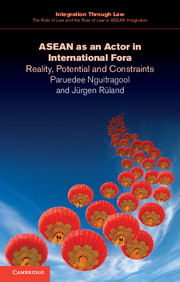Book contents
- Frontmatter
- Contents
- List of tables
- General editor's preface
- Acknowledgements
- List of abbreviations
- 1 Introduction
- 2 Analytical framework: a cognitive approach of externalization
- 3 ASEAN's cognitive prior and negotiating capacities
- 4 ASEAN as a negotiator in global fora: stages of negotiation
- 5 ASEAN as an actor in global fora: negotiation strategies
- 6 Case studies
- 7 Conclusions and future options
- Executive summary
- References
- Index
7 - Conclusions and future options
Published online by Cambridge University Press: 05 May 2015
- Frontmatter
- Contents
- List of tables
- General editor's preface
- Acknowledgements
- List of abbreviations
- 1 Introduction
- 2 Analytical framework: a cognitive approach of externalization
- 3 ASEAN's cognitive prior and negotiating capacities
- 4 ASEAN as a negotiator in global fora: stages of negotiation
- 5 ASEAN as an actor in global fora: negotiation strategies
- 6 Case studies
- 7 Conclusions and future options
- Executive summary
- References
- Index
Summary
Examining ASEAN's behavior in international forums from different angles leads us to the question of what we can conclude in general terms for regional organizations of the Global South and in more specific terms for ASEAN? At a theoretical level we have added a new explanatory approach to the literature on international negotiations, which has thus far been strongly dominated by neo-functionalist and rational choice approaches. In a constructivist reinterpretation of the neo-functionalist externalization thesis, we argued that more than material institutional factors such as functional specificity, heterogeneity and centralization, it is cognitive factors such as the world views – shaped by historical experiences – of decision-makers that have a major bearing on the cohesiveness of regional organizations. The more these cognitive factors are entrenched in the collective memory of a region's elites the more they tend to impact on the normative underpinnings of a regional organization and the latter's organizational structure. The more new experiences reproduce these historical experiences the more they strengthen ideational path dependencies, thereby externalizing the regional organization's intra-regional ideational dispositions regarding interactions with third states and in international organizations.
Even though we have to be careful in drawing farreaching generalizations from a single case study, our examination of ASEAN's behavior and cohesion in international organizations has brought to the fore more considerable evidence for our theoretical argument. These insights are mainly based on diachronic in-case comparisons. We can, most importantly, marshal abundant evidence that the world views determining the behavior of foreign policy elites in ASEAN member countries have not changed much over time. They may have temporarily fluctuated somewhat depending on contextual conditions, but overall they have remained the same. Power sensitivity, lingering distrust of partners and fear of Great Powers inside and outside the wider East Asian perimeter continue to fuel a proclivity for sovereignty-based cooperation norms. As a result, the national interest still dominates the behavior of member states towards each other as well as towards third parties.
- Type
- Chapter
- Information
- ASEAN as an Actor in International ForaReality, Potential and Constraints, pp. 249 - 272Publisher: Cambridge University PressPrint publication year: 2015

